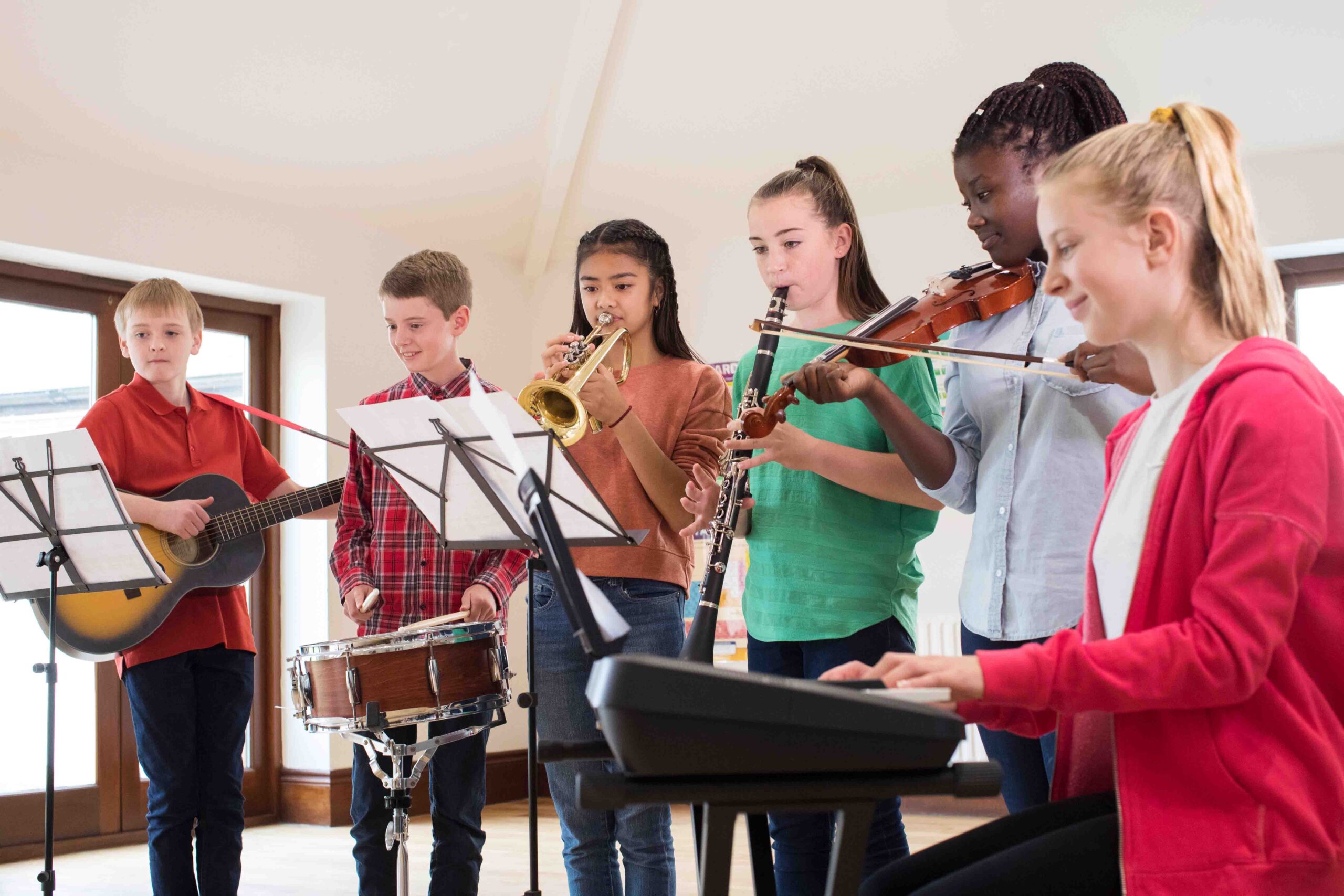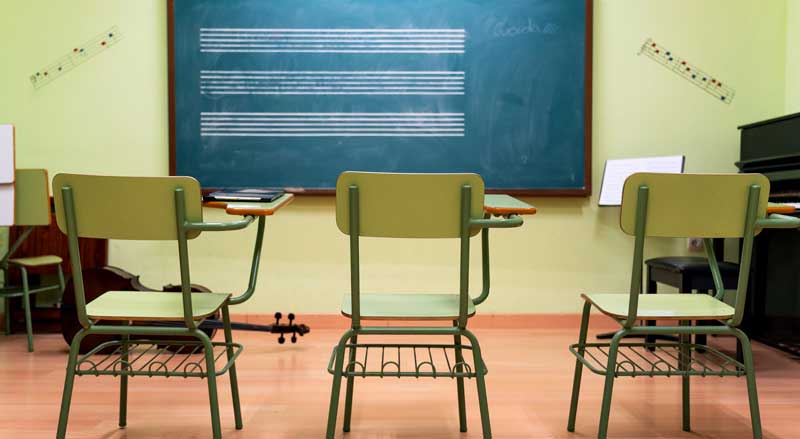

Games are a great way to make learning fun. They can help you understand the basic concepts of music and build on them. Games provide repetition of notes, rhythms, and terms. They strengthen fundamentals in a dynamic and entertaining way.
Why Games Are A Great Way to Learn
There are a lot of components in music. And, no matter your skill level, there is always room for growth. Games give students a way to gain skills and put them to use. Regardless of age or level of competition, using games makes learning music fun.
Games can be an introduction to music or a solution for students who struggle with the monotony of practice. From grasping terms to composing your own music, any exercise can become entertaining.
Music Games for Beginners
The benefits of music for young children is astounding. Music offers brainpower, social and emotional development, motor skills, creativity, expression, and discipline. Everything from the ABC’s to what Old McDonald had on his farm, we learn through music.
Music games for beginners start with listening, putting sounds into patterns, and mimicking. The following games introduce musical concepts such as rhythm, volume, and how to categorize sounds.

1. Start with Nursery Rhymes
Everyone remembers at least one nursery rhyme from their childhood. The introduction of these songs teaches us rhyme, rhythm, repetition, and early language. For young toddlers simply singing the songs is useful and fun. When you’re child gets a little older, have them act out the rhyme to boost creativity. Some songs you may choose can include Twinkle Twinkle Little Star, The Wheels On The Bus, or The Itsy Bitsy Spider.
2. Freeze Dance
A very fun way to teach rhythm, dancing, motor skills, social skills, and cognition. Have everyone stand in a circle and dance while a song plays. When the music stops so should the dancing. Whoever doesn’t freeze when the music turns off is “out”.
3. Create Your Own Drums
This is a fun and creative way to introduce your child to instruments. Use materials like a coffee can, Tupperware, and soup or paint cans, to make drums. You can leave them empty or place items like beans, beads, or rice to create different sounds. Use your hand or a spoon to strike the drum and listen to the sounds each canister makes. This will help children learn about sound dynamics and rhythms.

Music Games for Young Musicians
1. Fishbowl
This game is played best amongst a big group. It entails cutting paper into squares and writing the terms to be reviewed. Place the squares into a bowl. Divide the learners into two groups. One member from each team draws a square from the “fishbowl” and explains the term to teammates. Teammates guess. Round two involves using one word to describe terms while teammates guess. Then in round three, players can only act out terms. Interesting, right?
2. Little Maestros
Little Maestros is a great way to introduce your child to sheet music. All you are going to need is a piece of paper and a pencil. Start by creating a long list of your very own symbols that are easy to draw like circles, waves, lines, and squares. From there, you need to assign a different noise to each symbol that can be made using your body, not an instrument. For example, draw a circle and assign it to tapping your foot. You should do this for clapping, whistling, stomping, snapping, etc…
Each sound you create should have at least four different symbols associated with it. From there you will demonstrate how to write a simple rhythm using the symbols you created and then play the rhythm yourself so your child can understand the concept. After a few examples, encourage your child to come up with some music of their own.
3. Hear it! Clap it! Write it!
This game may be a little challenging at first, but with the right instruction, it’s a great way to learn how to write rhythms. Start by explaining how 4/4 time signature works. You are also going to need to teach your child whole notes (semibreves), half notes (minims), quarter notes (crotchets), and eighth notes (quavers).
Next, you are going to need to give them a dry erase marker and a dry erase board separated into 16 squares (4 x4). Clap out some basic rhythms and have your child clap them as well. Have them write the rhythm into the squares. Start easy and work up to difficult patterns.
Games for Music Lovers
Music games don’t just have to be about learning, they can also be played by people who share a common love for music. Here are some games for people music lovers of any age:
• SongPop: An online music trivia game that features a variety of music geners.
• Icon Pop Song: Learn more about your music artsists while showing off your knowledge about your own favorite music and musicians.
• Lips: If you love karaoke you will love this game where you select songs to sing and get a score based on musical prowess such as pitch and note length.
• Encore: A card game that pits you against your friends in a singing showdown.

Educational Games About Music
Without goals, music lessons can become overwhelming. This is especially true when learning to play a new instrument. There are many challenges that can arise like proper positioning and tone. But, including games into your practice routine can break up the time and give your music chops a kick!
Here is a list of interactive games that are fun, educational, and easy to use on-the-go:
1. Heads Up
A game app (iOS)(Android) introduced by Ellen DeGeneres on her show some years back. The app provides customizable game decks. Game decks make memorizing information a little more fun. The game provides users with stats. So you can play against yourself or with others. Heads Up can be a timed game and it allows players to watch their attempts afterward.
2. Tune Train
Tune Train is a fun app for kids that allows them to play around and create different tunes and melodies while learning the fundamentals of music. To put it simply, different structures will pop up on the screen with different objects on each level of the structure. The screen moves to the right while your child draws a line through the different objects they choose. The beauty is that each object represents a different note, making this app fun and informative.
3. Piano Dust Buster
Piano dust buster gives you the power of a digital piano at your fingertips. With this app, your child can select songs that differ by difficulty. From there the app will place sheet music on the screen. The music won’t progress until you hit the correct note on the piano.
4. Music Tech Teacher
This website was developed by a teacher for prospective students. It lets you access sheet music, quizzes, and tests to increase your music skills.
5. New York Philharmonic Kid Zone
Created by the NY Philharmonic Orchestra, this website lets you access fun and unique music tests. It also boasts interactive introductions to famous composers, conductors, and musicians. There are other symphonies that offer similar websites as well so take a look at the different orchestras that are in your area.

Games are a fun way to practice terms, learn more about arists, or let loose and have fun with your music friends. They give you an opportunity to think outside the box and get creative.
For more ways to make learning music fun, contact us. Our teachers are all certified music professional who know how to engage with students and build on thier skills. We help music students create goals and exceed them with direction and practice.


